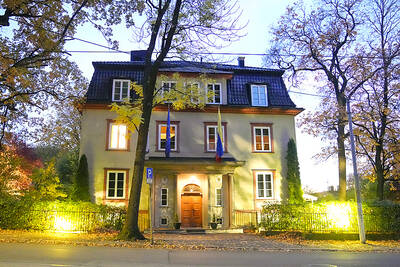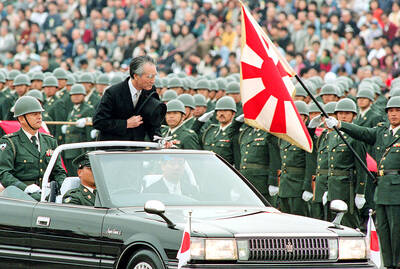French President Nicolas Sarkozy said he would cut France's nuclear arsenal to fewer than 300 warheads, seeking to balance defense of the nation -- he mentioned the threat from Iran -- against budgetary and changed strategic considerations.
In his first major speech as president on the French deterrent, Sarkozy also urged the US and China to fully commit to a treaty banning tests of nuclear weapons.
In addition, Sarkozy shifted somewhat from the nuclear doctrine of his predecessor, Jacques Chirac, by being slightly more ambiguous about the circumstances that might lead France to employ its nuclear weapons.
Sarkozy's decision to reveal the rough size of France's arsenal -- the Defense Ministry said the exact number of warheads is still secret -- appeared aimed at prodding other nuclear powers to be equally transparent.
AIRBORNE
Many of France's nuclear weapons are carried aboard submarines, with the rest on warplanes. Sarkozy said the airborne component would be cut by one-third, specifying that that included nuclear weapons, missiles and planes.
"After this reduction, our arsenal will include less than 300 nuclear warheads," he said on Friday. "That is half the maximum number of warheads that we had during the Cold War."
He also said that none of France's weapons is targeted at any nation.
SQUADRONS
France's airborne nukes are carried by three Air Force squadrons of Mirage 2000N and another Navy flotilla of upgraded Super Etendard jets.
They are all to be replaced by high-tech Rafale jets, in Air Force and Navy versions.
French defense expert Francois Heisbourg said the air fleet modernization allowed the size of the nuclear arsenal to be trimmed.
"When you have better planes taking over for older planes, you can afford to reduce the numbers," said Heisbourg, special adviser to the Paris-based Foundation for Strategic Research think-tank.
"That doesn't make us virtuous guys in itself, although of course it's nicer to say the numbers are going down than the numbers are going up. What does make us more virtuous than we were before is by saying `By the way, that means we're going to have 300.' And that meaning is, `Oh by the way, dear Chinese friends, you better tell us how many you've got.'"
The Federation of American Scientists, which tracks nuclear arsenals around the globe, said in a status report for this year that France had 348 strategic nuclear weapons. It lists 193 for sites and for negotiations on treaties to ban short and intermediate-range ground-to-ground missiles and to ban the manufacturing of fissile material for nuclear weapons. He also pressured to China and the US to ratify a nuclear test ban treaty they signed in 1996. France ratified it a decade ago.
RATIFICATION
Heisbourg said ratification by China and the US would "put pressure on countries that have been building things that look like test sites, like the North Koreans or, indeed, the Iranians."
He also said a global treaty banning intermediate-range missiles could put severe pressure on India, Iran, Pakistan and North Korea.

The Venezuelan government on Monday said that it would close its embassies in Norway and Australia, and open new ones in Burkina Faso and Zimbabwe in a restructuring of its foreign service, after weeks of growing tensions with the US. The closures are part of the “strategic reassignation of resources,” Venezueland President Nicolas Maduro’s government said in a statement, adding that consular services to Venezuelans in Norway and Australia would be provided by diplomatic missions, with details to be shared in the coming days. The Norwegian Ministry of Foreign Affairs said that it had received notice of the embassy closure, but no

A missing fingertip offers a clue to Mako Nishimura’s criminal past as one of Japan’s few female yakuza, but after clawing her way out of the underworld, she now spends her days helping other retired gangsters reintegrate into society. The multibillion-dollar yakuza organized crime network has long ruled over Japan’s drug rings, illicit gambling dens and sex trade. In the past few years, the empire has started to crumble as members have dwindled and laws targeting mafia are tightened. An intensifying police crackdown has shrunk yakuza forces nationwide, with their numbers dipping below 20,000 last year for the first time since records

EXTRADITION FEARS: The legislative changes come five years after a treaty was suspended in response to the territory’s crackdown on democracy advocates Exiled Hong Kong dissidents said they fear UK government plans to restart some extraditions with the territory could put them in greater danger, adding that Hong Kong authorities would use any pretext to pursue them. An amendment to UK extradition laws was passed on Tuesday. It came more than five years after the UK and several other countries suspended extradition treaties with Hong Kong in response to a government crackdown on the democracy movement and its imposition of a National Security Law. The British Home Office said that the suspension of the treaty made all extraditions with Hong Kong impossible “even if

Former Japanese prime minister Tomiichi Murayama, best known for making a statement apologizing over World War II, died yesterday aged 101, officials said. Murayama in 1995 expressed “deep remorse” over the country’s atrocities in Asia. The statement became a benchmark for Tokyo’s subsequent apologies over World War II. “Tomiichi Murayama, the father of Japanese politics, passed away today at 11:28am at a hospital in Oita City at the age of 101,” Social Democratic Party Chairwoman Mizuho Fukushima said. Party Secretary-General Hiroyuki Takano said he had been informed that the former prime minister died of old age. In the landmark statement in August 1995, Murayama said